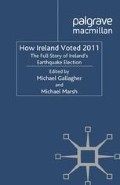Abstract
The corresponding chapter in the 2007 book in this series described the election as ‘the earthquake that never happened’. Change in 2011, in contrast, was truly seismic. Fianna Fáil suffered a negative tsunami of votes that has few parallels among governing parties anywhere, while Fine Gael, Labour and Sinn Féin all achieved record performances. The left as a whole achieved its highest ever level of support. There are strong elements of continuity amidst the upheaval, as we shall see, but by any standards this was an extraordinary election. In the next chapter Michael Marsh and Kevin Cunningham assess the evidence as to why the voters behaved as they did, and in Chapter 13 Peter Mair places the result in a comparative context and considers the implications for the party system. In this chapter we will discuss the results themselves in detail, identifying patterns in party gains and losses, asking why the conversion of votes into seats produced the highest level of disproportionality ever, and discussing the background of the members of the 31st Dáil.
Access this chapter
Tax calculation will be finalised at checkout
Purchases are for personal use only
Preview
Unable to display preview. Download preview PDF.
Notes
Nicole Bolleyer, ‘The Irish Green party: from protest to mainstream party?’, Irish Political Studies 24:1 (2009), pp. 603–23, at p. 620.
Liam Weeks, ‘We don’t like (to) party: a typology of independents in Irish political life, 1922–2007’, Irish Political Studies 24: 1 (2009), 1–27.
Michael Gallagher, Michael Laver and Peter Mair, Representative Government in Modern Europe, 5th edn (Maidenhead: McGraw-Hill, 2011), p. 391.
Rein Taagepera and Matthew Soberg Shugart, Seats and Votes. The effects and determinants of electoral systems (New Haven and London: Yale University Press, 1989), pp. 112–25.
For the rationale and elaboration of such a scheme, see John Coakley, ‘Revising Dáil constituency boundaries: Ireland in comparative perspective’, Administration 55:3 (2007), pp. 1–30, and ‘Does Ireland need a constituency commission?’, Administration 55: 4 (2008), pp. 77–114.
Tom Kelly, ‘Proposed vote transfer policy leads to tensions within Fine Gael ranks’, Connaught Telegraph, 8 February 2011.
See the account in Olivia Ryan and Christine Doherty, ‘FF candidates in Louth turf war’, Drogheda Independent, 16 February 2011.
This was a feature of the single non-transferable vote system, which Japan employed at elections prior to 1996. Examples, and comparisons with vote management in Ireland, are given in Michael Gallagher, ‘The Japanese House of Councillors election 1998 in comparative perspective’, Electoral Studies 20:4 (2001), pp. 603–25, at pp. 605–8.
Seán Keane, ‘Checking the windows for a draught’, Kilkenny People, 11 February 2011.
For general discussion of the impact of party and of candidate on voters’ decisions, see Michael Marsh, Richard Sinnott, John Garry and Fiachra Kennedy, The Irish Voter. The nature of electoral competition in the Republic of Ireland (Manchester: Manchester University Press, 2008), pp. 146–60.
Michael Gallagher (ed.), Irish Elections 1948–77. Results and analysis (London: Routledge and PSAI Press, 2009), p. 315. Of course, the range of options in 1973 was much less extensive.
Richard E. Matland and Donley T. Studlar, ‘Determinants of legislative turnover: a cross-national analysis’, British Journal of Political Science 34:1 (2004), pp. 87–108, at p. 93;
Michael Gallagher, Michael Laver and Peter Mair, Representative Government in Modern Europe, 5th edn (Maidenhead: McGraw-Hill, 2011), p. 67.
Michael Gallagher and Lee Komito, ‘The constituency role of Dáil deputies’, pp. 230–62 in John Coakley and Michael Gallagher (eds), Politics in the Republic of Ireland, 5th edn (Abingdon: Routledge and PSAI Press, 2010).
Categorising TDs occupationally is not straightforward. As Noel Whelan notes, many TDs, in their campaign material or online biographies, downplay any pre-political occupation, presenting themselves as ‘full-time public representatives’; some Sinn F6in deputies in particular, he says, ‘appear to have had no occupation before politics or are shy about sharing it’. Noel Whelan, ‘The continuity behind the Dáil transformation’, Irish Times, 5 March 2011.
See discussion in Mary-Clare O’Sullivan, ‘The social and political characteristics of the twenty-eighth Dáil’, pp. 181–94 in Michael Marsh and Paul Mitchell (eds), How Ireland Voted 1997 (Boulder, CO: Westview Press and PSAI Press, 1999), p. 184.
Editor information
Editors and Affiliations
Copyright information
© 2011 Michael Gallagher
About this chapter
Cite this chapter
Gallagher, M. (2011). Ireland’s Earthquake Election: Analysis of the Results. In: Gallagher, M., Marsh, M. (eds) How Ireland Voted 2011. Palgrave Macmillan, London. https://doi.org/10.1057/9780230354005_7
Download citation
DOI: https://doi.org/10.1057/9780230354005_7
Publisher Name: Palgrave Macmillan, London
Print ISBN: 978-0-230-34882-0
Online ISBN: 978-0-230-35400-5
eBook Packages: Palgrave Political & Intern. Studies CollectionPolitical Science and International Studies (R0)

